My client came to me with a goal: make their landmark hotel known as the central hub for events in the Memphis area and remind people of the rich history at this iconic hotel. Both celebrities and locals alike have decades of memories at this hotel. Famous football players and musicians lounged on lobby couches, business people held their very first conferences in the Hilton’s banquet halls, and now-married couples experienced their first kiss during high school prom on the hotel’s dance floors.
It is easy for a hotel to claim, “We are the central event hub in the community.” It is harder to go out on a limb and actually do it because you can’t convert people’s thinking overnight. Rebranding a hotel in the community’s eyes is a long-tail marketing strategy that takes years to develop. However, you can create smaller campaigns to achieve this larger over arching goal.
Now, you will not achieve an enhanced reputation by relying on basic discounted rates to get short-term room sales. Having a 20% of BAR deal once in awhile will help fill those rooms to hit your quarterly goals, but it does nothing to enhance the reputation of the hotel in the long-term. On the other hand, if you provide a unique deal or event unlike anything else in your market – well, there you might have something! I get it, though: hotels and management companies have limited budgets without much wiggle room. They have revenue goals to hit. It is difficult to justify spending extra ad money on an effort where you might not see an immediate measurable ROI. And maybe you won’t even be at that property in five or ten years to reap the benefits of those efforts–someone else will take the credit and reward. Short-term vs. long-term reward is a real pickle for any business, that’s for sure.
Despite conventional mid-range hotel practice, the hotel team and I aimed to put together a special event to help with the long-term strengthening of the property’s reputation.
Enter: The Food Truck Campaign Idea
One initiative in the hotel’s long-term effort was the Food Truck Campaign. The hotel team organized “Food Truck Wednesdays” – a weekly event in the fall where they arranged for five different food trucks from the Memphis Food Truck Alliance to set up in the hotel parking lot and the hotel provided tables and music to patrons. They also provided free ice cream to anyone who donated to Give Kids the World Village, a well-known charity in the hospitality world that provides children suffering from life-threatening illnesses and their families free week-long vacations at a whimsical resort in Kissimmee, Florida near Disney World.
With this Food Truck event, the hotel’s Director of Sales hoped to welcome local businesspeople to the hotel on their lunch breaks, create a fun space for the community, raise money for deserving charities, and help brand the hotel as a central hub for the city of Memphis.
Blue Magnet’s job was to promote the campaign online.
How We Promoted the Food Truck Campaign Together
First, Blue Magnet created a unique standalone landing page for the hotel with information about the event, pictures of the hotel and food trucks, and links to the hotel’s Facebook Page and website. Since this hotel did not have the flexibility of an independent site, creating a standalone landing page that could only be accessed through these ads was a budget-friendly online marketing solution when you don’t have a vanity site.
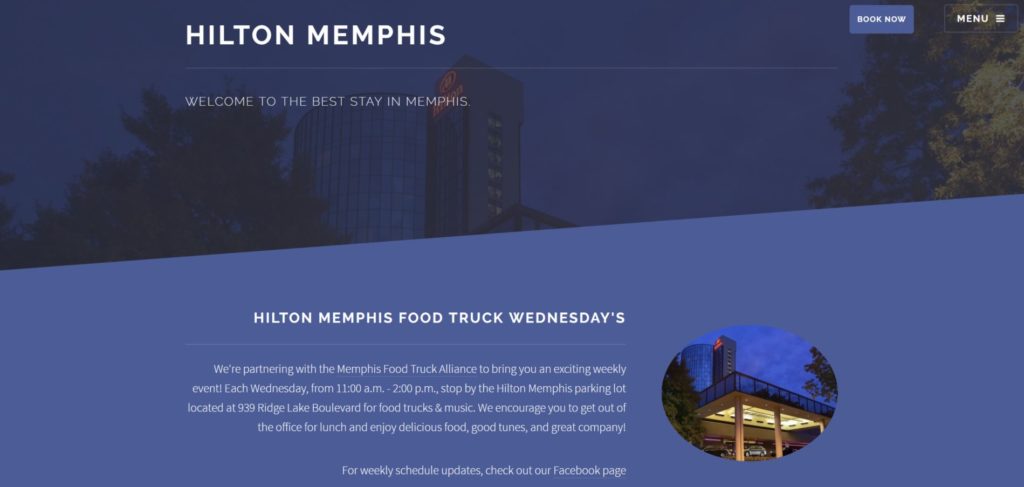
Second, we promoted the event on Facebook. We used design elements from the standalone webpage to create a new cover photo focused on the event and also weekly posts we would push out every Monday with a list of the food trucks guests could expect at the event with links to the standalone webpage for more information.
That way, fans of the hotel could keep up with what food trucks were coming in that Wednesday and they could get excited about the event, look up the food options beforehand, and choose which events piqued their interest.
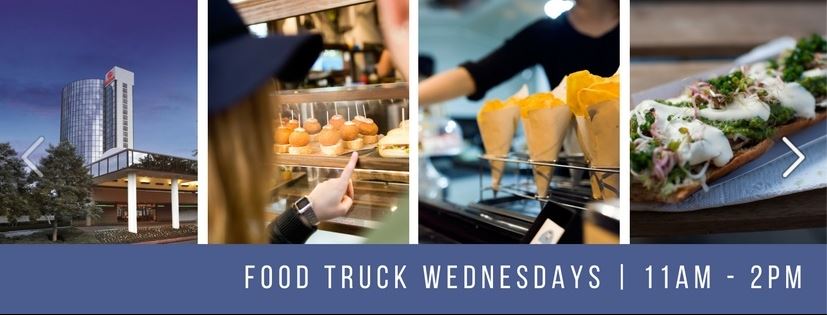
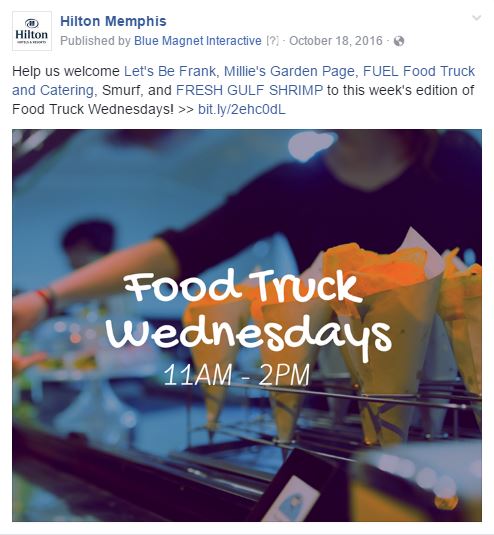
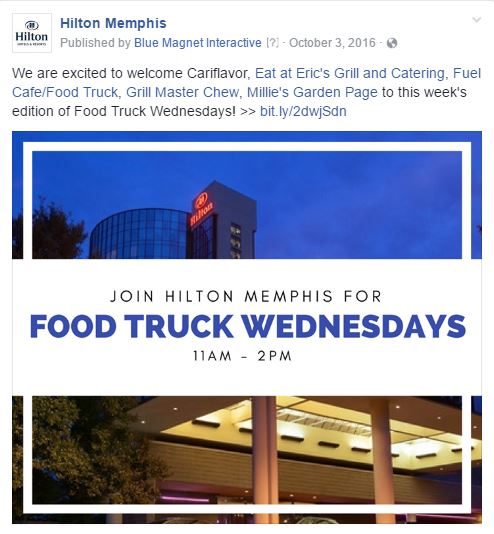
We used $300 on Facebook ad campaigns to create awareness about the event and targeted a very specific, local audience to make sure the right people saw the ads and promoted posts. The Director of Sales, Greg Milligan, helped out by taking photos and videos at the first event that were used future campaigns.
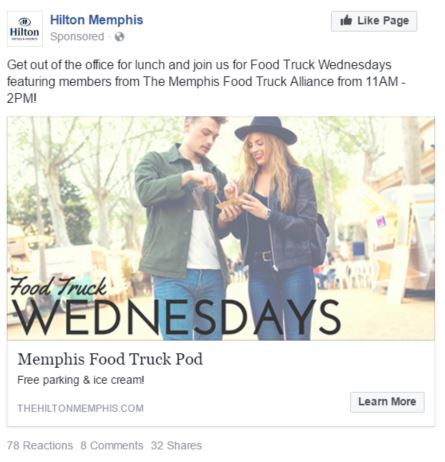
To create additional buzz, the hotel created a press release about the event.
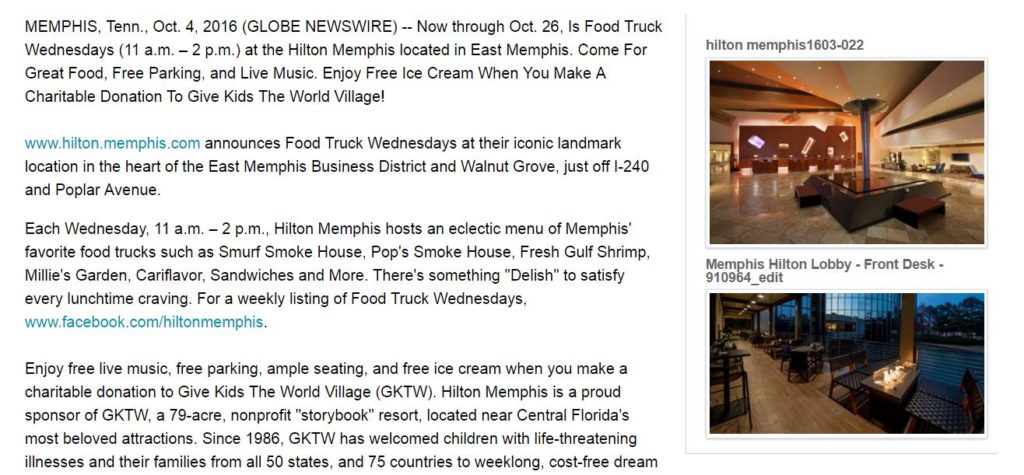
The hotel hosted a special Making Strides Against Breast Cancer Day at one of their Food Truck Wednesdays where the organization set up donation boxes and a giant inflatable pink chair for guests to take pictures on.
The Results
With only $300 towards ad spend between September and October 2016, the campaign brought stunning results.
Total from the ads running from September 14th, 2016 – October 14th, 2016:
- 41,149 people reached
- 931 link clicks from Facebook
- 1,004 sessions to the landing page
- 1,507 new fans
- $0.32 cost per click
Total from all posts – 8 organic, and 1 boosted with $25
- 8,871 people reached
- 121 likes and loves
- 28 comments
- 29 shares
- 594 post clicks
These stats show the incredible Facebook engagement the hotel nurtured from the guests and organizations it partnered with. From the campaign, the hotel received the best “bad feedback” a hotel could ask for:
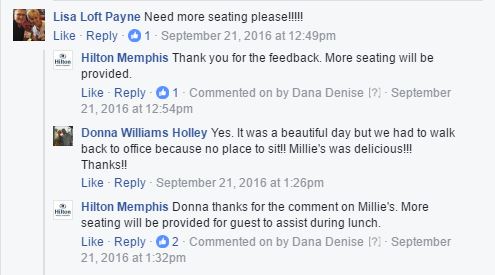
And they received comments from the organizations they partnered with:

Because of the buzz created on social media and the press release, the hotel got 200+ people to attend each Food Truck Wednesday, 1,507 new Facebook fans, and lots of positive feedback from the community.
Local news featured the Making Strides Against Breast Cancer Day during one of the Food Truck Wednesdays, generating more awareness about the event and the hotel. They created a place for the community of local business people to dine, enjoy the nice weather, and network on their lunch breaks… a community of people who will remember this hotel when they have to plan a business conference, holiday party, or recommend a place to stay to a colleague flying in from out of town. The hotel saw so much success from the event that they plan on hosting more in the future.
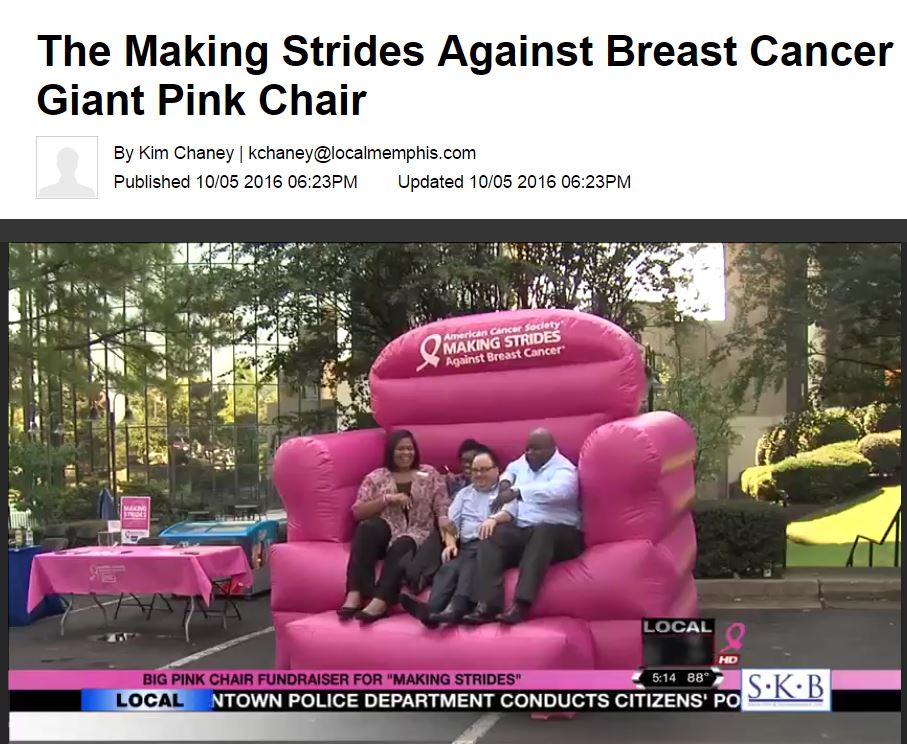
Five Reasons Why this Campaign Succeeded
If you boil this campaign down to the bare bones, communication, relevance, and genuineness are the three main reasons why it succeeded, but let’s back up a bit and talk about what all that means.
Extraordinary Event People Care About
The hotel set up a concrete event with a concrete goal: Food Truck Wednesdays and creating a community event to amplify their brand’s message as a landmark hotel.
While this might seem obvious, many hotels I have worked with in the past want to run a campaign on an ordinary discounted deal that is not compelling.
I get it, you have a lot on your plate and it is easier to set up a quick discount than it is to arrange an entire event. But if you take the time to put together something unique, it will resonate with people. Think of this from a consumer’s perspective: you get ads about discounts all the time and it becomes background noise after a while, doesn’t it? You only click on an ad if it is unique and resonates with your interests.
Set up something ordinary and it will be drowned out by all the other online noise, set up something special and people will care. Seth Godin discusses this in his remarkable Ted Talk where he presents the “Purple Cow Theory”. He explains how the more bizarre and unique an idea is, the more it will spread.
Specific Goal and Target Audience
The Food Truck Campaign was successful because the hotel had a specific goal and target audience. Again, something that sounds obvious but in actuality is a little blurry.
Some hoteliers want to run a campaign to simply “gain more bookings.” They do not specify a goal range such as, “90-100 room nights.” Without a specific goal, it is difficult to measure the success of a campaign.
Likewise, many hoteliers hesitate to specify a niche target audience because they are afraid of excluding a potential customer. So rather than creating an ad for “the working mom in [city],” we will have to create ads for “the working mom in [city[” and “the businessman two states away” and “the couple on vacation” and “the alumni flying in for a football game.”
While I can see where the hotelier is coming from, trying to go after everyone ends up with losing everyone. I am a unique person and when I get served an ad, I will not click on it unless it speaks to me as an individual.
The Memphis hotel team gave the Blue Magnet team a very specific goal and target audience to work with, and that made all the difference. When reflecting upon the campaign, my colleague (who created and ran the Facebook campaign) said, “Our collaboration was crucial to the success of the campaign and allowed us to understand the client’s vision and overall interests. With the information provided by the client, we were able to set specific parameters and only have our ad shown to specific individuals. While this ended up creating a smaller audience, our ads had a high relevance score and were only shown to those interested.”
In short, bigger, is not always better. Being relevant is.
Facebook Was the Perfect Channel for an Awareness Campaign
Facebook is where people go to socialize. Just like a real life conversation, it is where people have a few laughs, gain some knowledge, argue about politics, and learn about social events. When trying to spread the word about an event, Facebook is the perfect avenue to do that. People on Facebook are in the mood to think about social things, and when they see this Food Truck Campaign that is relevant to their interests, they will get excited, share the info, and make plans to partake.
Also, this hotel was willing to put $300 ad spend behind the campaign so we could adequately amplify the message. If they had only given us an ad budget of $25, or even no budget at all, we wouldn’t have been able to market the event as successfully.
The Length of the Campaign
The duration of the food truck event and the corresponding awareness campaign allowed time for people who attended the event to create buzz about it. Sources were not just talking about a single event that happened once, they talked about an event they went to and can plan on going to the following week.
Since the goal was creating a community, this weekly set up enabled that community to form organically.
It also enabled Blue Magnet to analyze the data from the previous week and make tweaks to the copy and audience targeting for the next week. One of Blue Magnet’s Social Media Managers said, “The duration of the ad campaign allowed me to monitor the performance and analyze data over time and gave me the opportunity to create organic content that supported the campaign and support the ad content.”
While not every campaign or event needs to be ongoing, this unique situation allowed for a the client’s goal to thrive and for Blue Magnet to fine-tune the campaign to reach even more people.
An Awareness Campaign Born from a Place of Authenticity
When my client and I talked about this campaign, using the Food Truck Campaign to nurture a community and reputation for the hotel was always first on our minds, hotel revenue was second.
From the very start, the architects of this project built it upon a place of love for the community and pride for the hotel. The love of the community permeated through the campaign and resonated with the patrons who attended the event.
Show – don’t tell – is a way to build trust. Rather than tell people, “We are good at hospitality. Now book our hotel oh please oh please!” The Director of Sales and his team aimed to demonstrate how great they were at hospitality and how much they care about the community through Food Truck Wednesdays.
This feel-good event locals could participate in will resonate longer and more powerfully than any discount, and will indirectly lead to hundreds of more bookings, restaurant guests, and conferences in the future.
An awareness campaign like this is a long-tail marketing strategy, an investment in a distant goal. It will bear more fruit than a short-tail campaign, but over a long period of time.
With high staff turnovers and pressures from management groups to produce on a yearly basis, putting marketing money towards a long-tail marketing projects may not seem attractive. You as a DOS or revenue manager may not be at the hotel long enough to see the return. You have pressures from the management group to hit a certain occupancy rate, event bookings, etc. But imagine what you could do if management groups encouraged and even rewarded you for going after these long-tail goals for the hotel?
The Power of Long Term-ROI, Not Just Short Term Bookings
This is a project that inspired me as a marketer and may inspire you as a hotelier, too.
Greg Milligan, the Director of Sales at this property, saw the relationship between the hotel and the city of Memphis in a unique way that is rare to find in the average hotelier. He understood the power of spending marketing dollars for a long term ROI, not just short term bookings.
Through collaboration over the phone and via email, my client and I bounced back ideas to improve this, and future, campaigns, celebrated the successes of this project, and, hopefully, inspired other hoteliers to think outside-the-box to transform a hotel into something just a little bit more.




